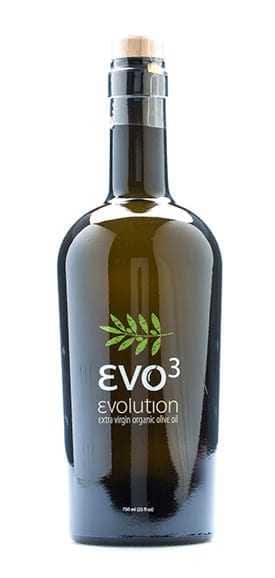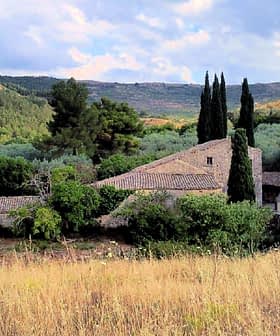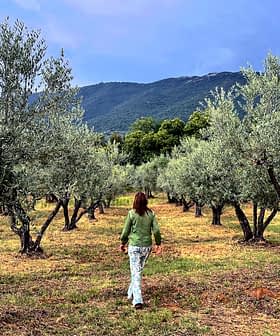Stratis Camatsos is not afraid to swim against the tide. Born in Mississippi to Greek parents, he told Olive Oil Times that he moved to Greece with his family when he was twelve, headed to the UK and the USA to complete his education, worked as an attorney in the US and Europe, and then returned to Greece again in 2013, in the middle of the economic crisis.
He returned to launch evo3, which produces and exports award-winning extra virgin organic olive oil (the 3 Os). Along with his father, George, Camatsos quickly turned a small family business into a unique social enterprise that supports reforestation projects in Africa, works with a women’s cooperative in Lesbos to produce an unusual sweet olive jam, and plans to use augmented reality for affordable marketing.
The circle of life begins and ends with trees.
Camatsos fondly remembers summers in Lesbos during his childhood, when he wandered through his grandfather’s olive groves and visited the olive mill with his father, listening and observing, struck by the smell of fresh olive oil. His father revived the family’s 10,000 neglected olive trees after he moved back to Lesbos, turning to an EU subsidy for organic farming to support his renewed efforts.
Later, Stratis Camatsos and his Hungarian wife Gyorgyi Gurban, an environmental law expert now working for the United Nations Environment Programme in Athens, came up with the idea of using some of the proceeds from olive oil sales to support an environmentalist project. Camatsos explained, “I’m really passionate about the environment, and I wanted to give something back. At least leave the world as you found it, if not better — that should be the aim of every person. That’s what I’m striving to do.” The result: for every bottle of evo3 olive oil or jam sold, a tree is planted in a deforested area.
Camatsos chose to support reforestation because “the whole cycle of our product starts with the tree, ends with the tree.” He tried to find an NGO to work with in Greece, since many burned areas needed replanting, but high costs and red tape got in the way. Since he was just getting started with evo3, he could not contribute as much as NGOs needed for reforestation projects in Greece. But in the US, he found Eden Reforestation, a well-established NGO with projects already underway in Ethiopia and Madagascar. They were glad to accept any funding they could get, and Camatsos was pleased to learn that their projects went beyond the tree-planting that spurred a regrowth of ecosystems to also support the local economies: local workers were hired and trained to plant trees and care for them, injecting money into impoverished villages as well as improving the soil quality so crops could be grown for use and sale. New income led to less child labor and human trafficking, as well as new village schools. This is just what Camatsos was looking for: “It encapsulates the social enterprise,” as he put it, and gives back to both people and the environment.
Back in Greece, Camatsos and his wife experimented with their own new recipes for a sweet olive jam. They turned to a small women’s cooperative in the village of Parakila in Lesbos, where the women were happy to fine tune the recipe, substituting organic green olives for black ones for an even better result. Camatsos said working with the cooperative “makes the [product’s] cycle even more local and sustainable.” Free of artificial additives and preservatives, the jam has the texture of finely chopped olives, their taste barely discernible in a mixture more defined by the orange peel, cloves, lemon juice, and brown sugar in this nicely sweet and spicy spread, which is very good on toast.

Evo3 exports 90 percent of its annual seven to ten metric tons of organic extra virgin olive oil to Europe and North America. Camatsos was troubled by a complete lack of new orders and a stalemate in negotiations with new customers during the three weeks banks were closed in Greece. A bank account in Belgium that he had opened when he lived there helped his business continue, and orders resumed once the latest loan agreement was signed by Greece and its creditors. But Camatsos criticizes the Greek government for its lack of support for the olive oil industry and especially for small and medium enterprises. The high taxes and excessive bureaucracy make it difficult, he said, to do business here. He contends that Greek olive oil producers need to unify, the government must help with quality certification, and the country should focus on producing high-quality extra virgin olive oil that consumers learn to value enough to pay the higher prices it deserves.
Camatsos has an innovative idea for small olive oil businesses that can’t afford to hire marketing firms but need to convince consumers to value their products: use augmented reality, an app and a service that could “give small producers a foothold via a more enhanced and immersed user experience.” An app could be designed so a tablet or smartphone pointed at a particular point could launch the user into an augmented reality experience that would “come to life and tell you a story” about the product. The story could be conveyed through a simple video or something more complex that would allow the user a 360-degree panoramic view of an olive grove, for example, or an African village that could be explored as the phone was rotated by the user. Although this has never been done in Greece, as far as he knows, Camatsos suggested that this is the future of marketing, especially when targeting millennials. He believes “the more a consumer can experience an item in the store,” the stronger the connection will be between the producer and the consumer.
And that’s not all. Focusing on transparency, trust, environmentalism, and high quality, Camatsos plans to expand evo3 to hire more seasonal workers, export to more locations, produce salad dressings featuring Mediterranean flavors, and support more green projects in Greece (perhaps another reforestation project in the mountains around Athens, or work with the Atenistas NGO, which brightens impoverished urban areas by making them greener).
Although the company was just founded in 2013, evo3 has already won a Bronze Award for branding at the Elaiotechnia olive oil competition in Athens and a Silver Award in the New York International Olive Oil Competition in 2014, plus the Diplome Produit Gourmet award at the World Edible Oils AVPA Paris Contest and a Great Taste Award at the gourmet competition in the UK this year. According to their website, “the circle of life begins and ends with trees. Our aim is taking oil to the soil / Organic for you, (r)evolutionary for the good of all mankind.”
- εvo3 extra virgin organic olive oil web site








